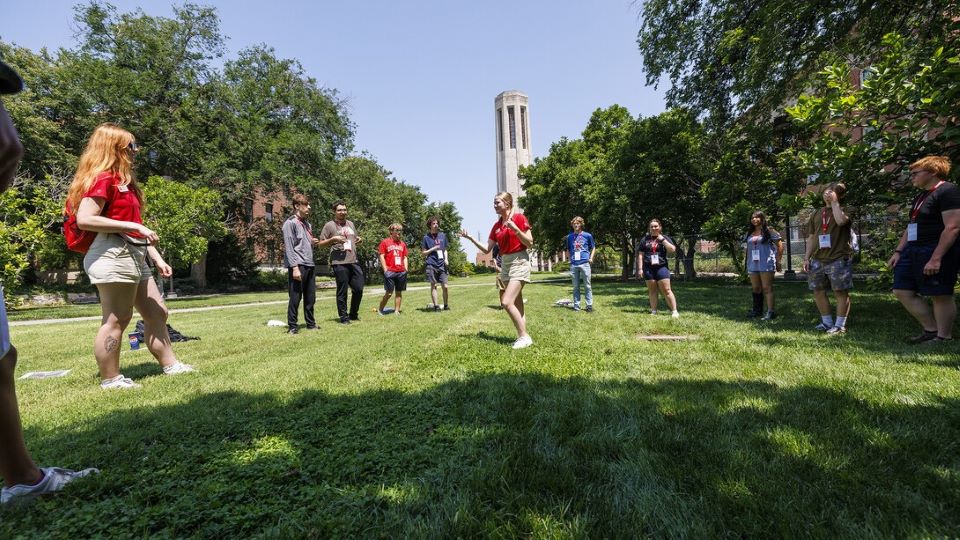
Here is a sample of stories shared in the national media in 2021:
A study by Anna Jaffe, assistant professor of psychology at Nebraska, and colleagues shows that the influx of students moving back in with their parents during the COVID-19 pandemic contributed to a substantial drop in college students’ drinking rates. The findings show that living off-campus, often with parents, could be a protective factor against heavy drinking. The research team also included Jason Ramirez, research assistant professor at the University of Washington; Shaina Kumar, doctoral candidate in the clinical psychology training program at Nebraska; and David DiLillo, professor of psychology at Nebraska. Stories on the study appeared in 10 Nebraska media outlets, including the Lincoln Journal Star, as well as Inside Higher Ed and University Business.
The Genoa Indian School Digital Reconciliation Project — co-directed by Margaret Jacobs, Charles Mach Professor of History and director of the Center for Great Plains Studies at Nebraska — was featured in a number of media outlets in November. The Genoa, Nebraska, school, which operated from 1884 to 1934, was one of more than 300 Indian boarding schools established by the U.S. government and churches in the late 19th and early 20th centuries to assimilate Native children and break their ties to families and tribes. Researchers say they have discovered the names of 102 students who died while at the school, the Omaha World-Herald reported Nov. 12. The Associated Press version of the article was picked up by 130-plus media outlets, including ABC News, The Guardian, USA Today, The Washington Post and Yahoo! News. The reconciliation project was also highlighted in The Daily Yonder on Nov. 5, the Independent and Esquire on Nov. 16, The New York Times on Nov. 17 and Mother Jones on Nov. 23. Jacobs wrote a guest column for The Washington Post on Nov. 24.
Some of our inventors, innovators and trailblazers
-
New research led by Ingrid Haas, associate professor of political science, has shown that the human brain processes politically incongruent statements differently — attention perks up — and that a candidate’s conviction toward the stated position also plays a role. Stories on the research appeared in Medical Xpress, Neuroscience News, Science Codex, Scienmag and a few other media outlets.
-
New research by Kate Lyons, assistant professor of biological sciences, and colleagues at the University of New Mexico suggests that the offspring of massive bipedal dinosaurs outcompeted medium-sized species for food, which would help explain the surprising lack of species diversity in an animal group that dominated the planet for roughly 140 million years. Stories on the research appeared in Gizmodo, Science and several other media outlets.
-
A “holy grail” long pursued by Husker physicists — a quantum material whose magnetic states could be altered by electric means alone, and above room temperature — could help herald the emergence of digital memory and processors that consume far less power, while potentially running even faster, than their modern-day counterparts. The team was led by Christian Binek, Peter Dowben and Alexei Gruverman, all faculty in the Department of Physics and Astronomy. Technology.org ran an April 5 article on the research breakthrough.
-
By compiling and analyzing mollusk fossil data from the past 145 million years, Will Gearty, postdoctoral researcher of biological sciences, and colleagues have shown that temperature largely explains the diversity of aquatic life in the tropics. Human-driven global warming is expected to reduce that biodiversity in coming centuries. Stories on the research appeared in the Environmental News Network, Phys.org, ScienceDaily, Scienmag and several other media outlets.
-
The University of Nebraska has received a five-year, $20 million award from the National Science Foundation’s Established Program to Stimulate Competitive Research to create a research and education cluster aimed at enhancing the state’s competitiveness in the field of emergent quantum materials and technologies, and boosting the participating institutions’ research and education capacity. Stories on the new Emergent Quantum Materials and Technologies (EQUATE) collaboration appeared in at least four Nebraska media outlets and WebMD.
Some of our trusted experts and recognized authorities
-
Margaret Huettl, assistant professor of history and ethnic studies, was one of three historians who consulted on the new “Oregon Trail” video game. Huettl, who is of Lac Courte Oreilles Ojibwe ancestry, researched old photos and drawings for accurate depictions of different tribes’ clothing and style. She discussed her work on the game in a May 12 NPR story, November episode of the podcast Getting Curious with Jonathan Van Ness and Dec. 3 Le Monde article. She was also interviewed about “New Storytellers: The Research Institute in Digital Ethnic Studies,” hosted by the university, for a June 17 Indian Country Today story.
-
Dawn O. Braithwaite, Cather Professor of interpersonal and family communication, was interviewed on a variety of topics in 2021. She discussed people relying on their “chosen family” during the COVID-19 pandemic for a Feb. 23 Wall Street Journal article; findings in the Annie E. Casey Foundation’s KIDS Count 2021 Data Book for a June 29 Deseret News article; the debate over singer and actress Jana Kramer’s use of the term “single mom” for a July 1 Yahoo! News story; why communication matters for a July 15 Psychology Today article; ways to be a better step-grandparent for a Sept. 21 AARP story; and best practices for communicating and expressing affection for a Nov. 29 Psychology Today article.
-
Tim Borstelmann, history, May in Politico, whether current world events are repeat of 1970s; November in USA Today, Freedom Riders whose 1961 sit-in campaign helped lead to desegregation of U.S. Route 40 in Maryland.
-
Kelsy Burke, sociology, March 19 in Religion News Service, guest column with the University of Oklahoma’s Samuel L. Perry on evangelical men and rhetoric of porn addiction, and how it relates to mass shooting in Atlanta; March in Insider, how Atlanta shooting shows dangers of American evangelicalism’s trademark “purity culture”; September in The Christian Post, theologian John Piper denouncing bedroom role-playing; October in The Washington Post, guest column with Smith College’s Nancy Whittier on push by conservative Christians and anti-pornography feminists to drive sexually explicit media off internet.
-
Deirdre Cooper Owens, history, director of the Humanities in Medicine program, February in The Washington Post, guest column on the United States’ long history of medical racism.
-
Tim Gay, physics, October in Inverse, physics behind tug of war; November in NFL Films, physics behind well-thrown football pass.
-
Sarah Gervais, psychology, May in Body+Soul, whether money can buy happiness.
-
Eileen Hebets, biological sciences, May in Undark, boom in whip spiders; August on The Animal Behavior Podcast, arachnid sensory systems, extreme mating behavior and science communication.
-
Katrina Jagodinsky, history, March in USA Today, York, an enslaved Black man who was part of Meriwether Lewis and William Clark’s expedition in early 1800s.
-
Jody Koenig Kellas, communication studies, December in Forbes, importance of storytelling during difficult times.
-
Tierney Lorenz, psychology, November on Sex and Psychology Podcast and December in Insider, debunking myths of the “hormonal woman.”
-
Julia McQuillan, sociology, June in Huffington Post, experiences of women of color in child-free-by-choice movement.
-
Chigozie Obioma, English, January on TheVibes.com, his short story “When the Risen Dust Settles” highlighted; January in Longreads, his short story “The Strange Story of the World” highlighted; January in Esquire, piece on chance encounter during his time as teenage street evangelist in Nigeria; February on Inland360.com, his college experiences in Cyprus and the United States, his novel “An Orchestra of Minorities” and how racism in America compares to that in other places; February on Literary Hub’s History of Literature podcast, his childhood in Nigeria, his novels “The Fishermen” and “An Orchestra of Minorities,” what he’s discovered about how fiction works, his love for Kazuo Ishiguro’s “The Remains of the Day” and his recent work with Alexander platform.
-
Timothy Schaffert, English, June in CrimeReads (1, 2), Entertainment Tonight, the Los Angeles Times, Oprah Daily and Publishers Weekly and July in Booklist, previews of his new novel “The Perfume Thief”; July in The Wall Street Journal, his five top books on art and culture in Nazi-occupied Paris; July in The Jewish Book Council, piece on Jewish perfumers in the 20th century.
-
Dai Shizuka, biological sciences, August in The Atlantic, study on female white-necked jacobins evolving to change colors to avoid being harassed by males; September on The Animal Behavior Podcast, social networks in humans and non-human animals, and the relationship between space use and sociality.
-
William G. Thomas III, history, June in The Washington Post, whether Johns Hopkins enslaved people.


